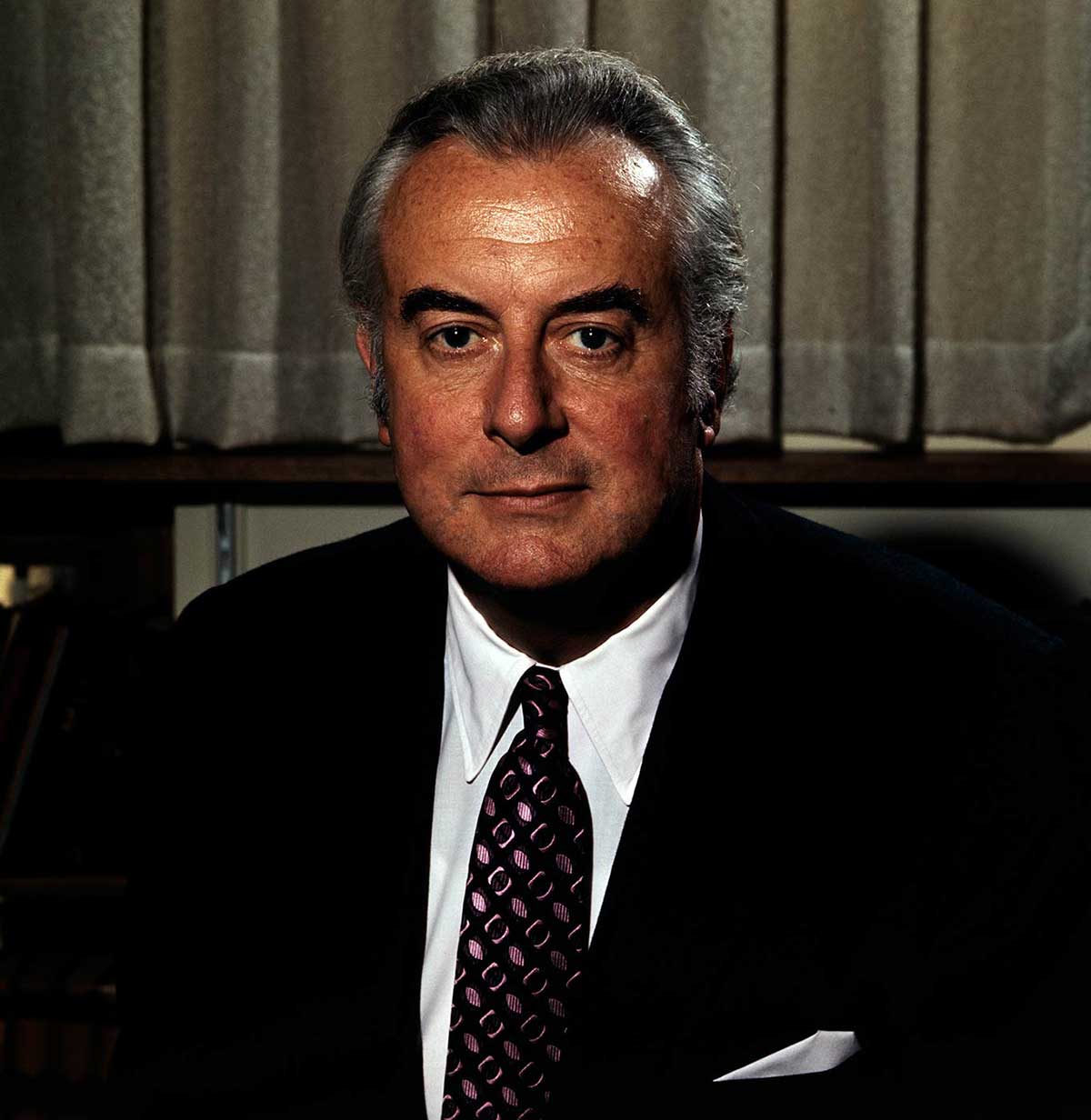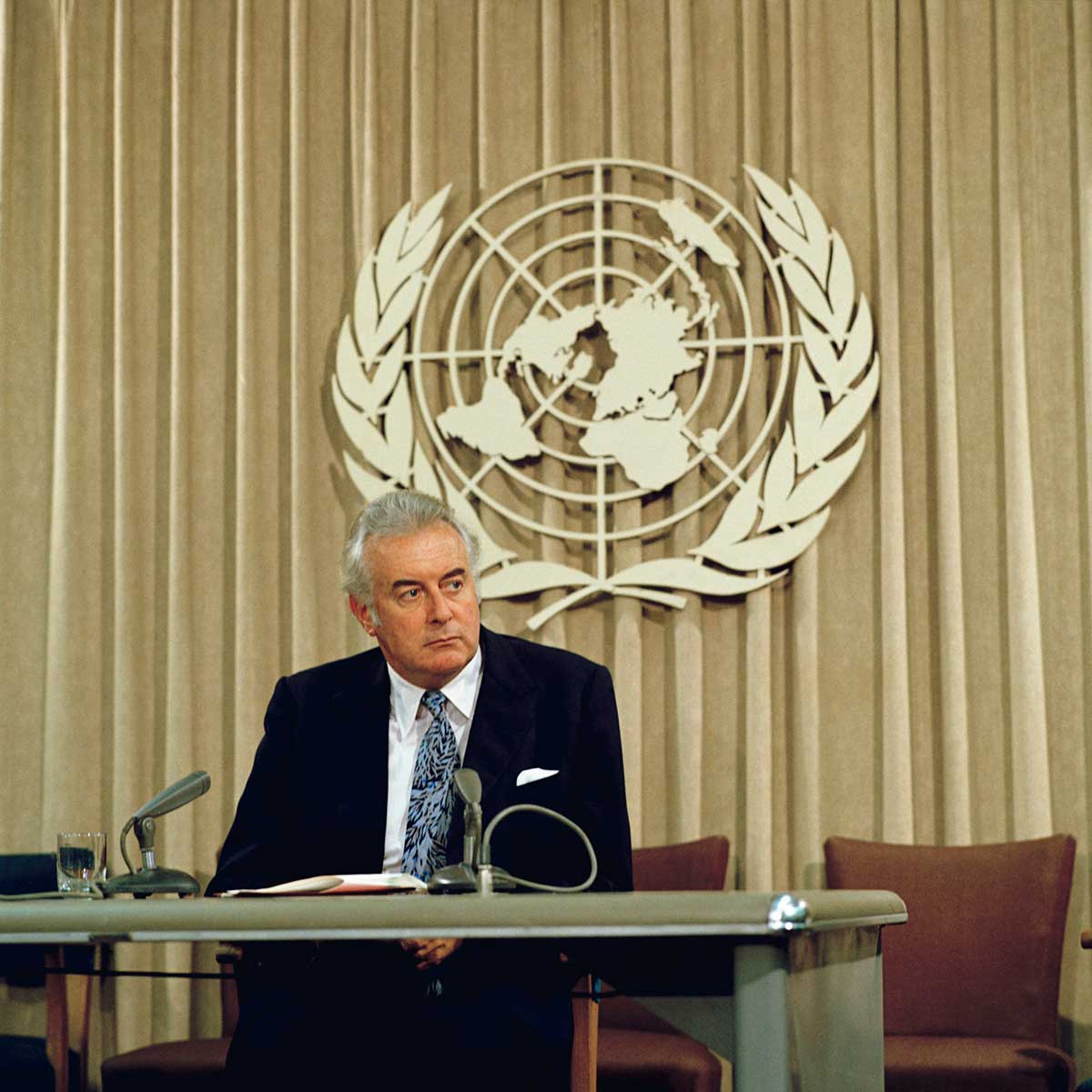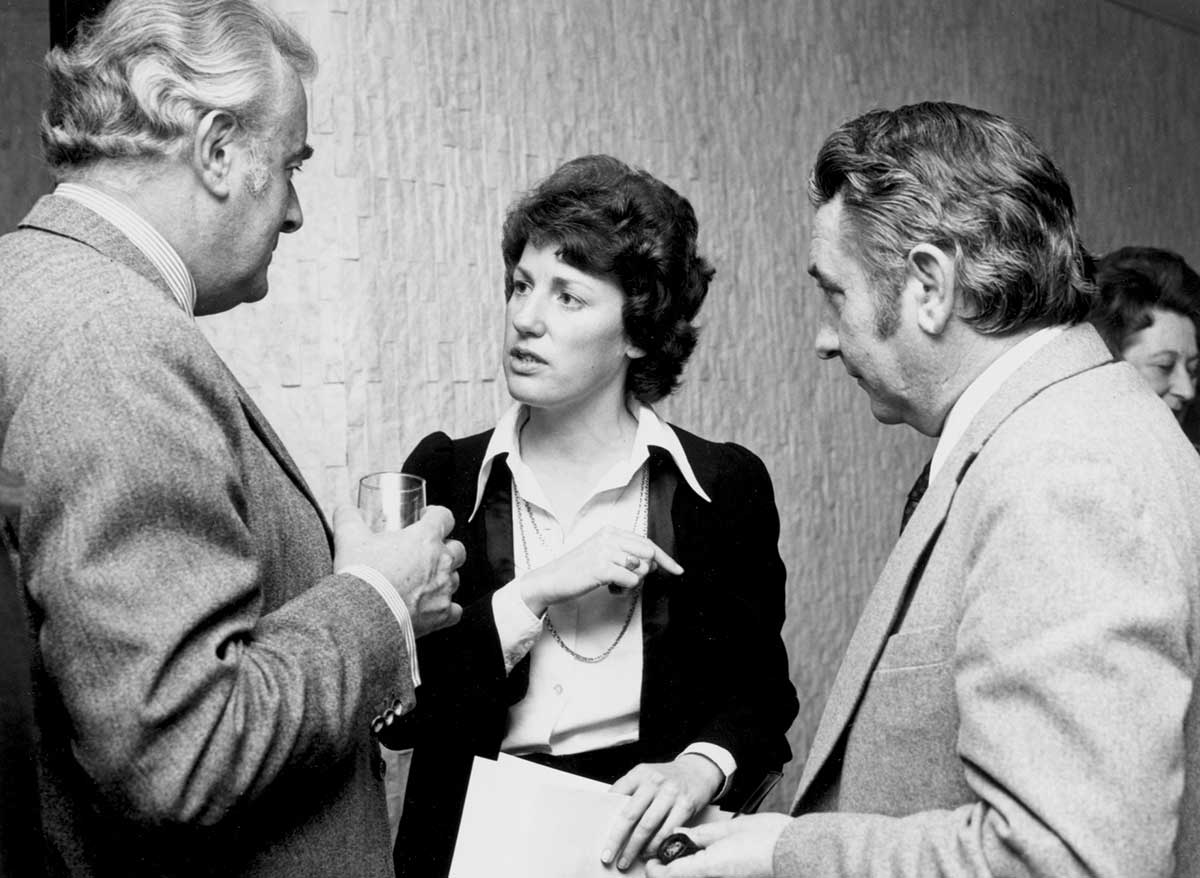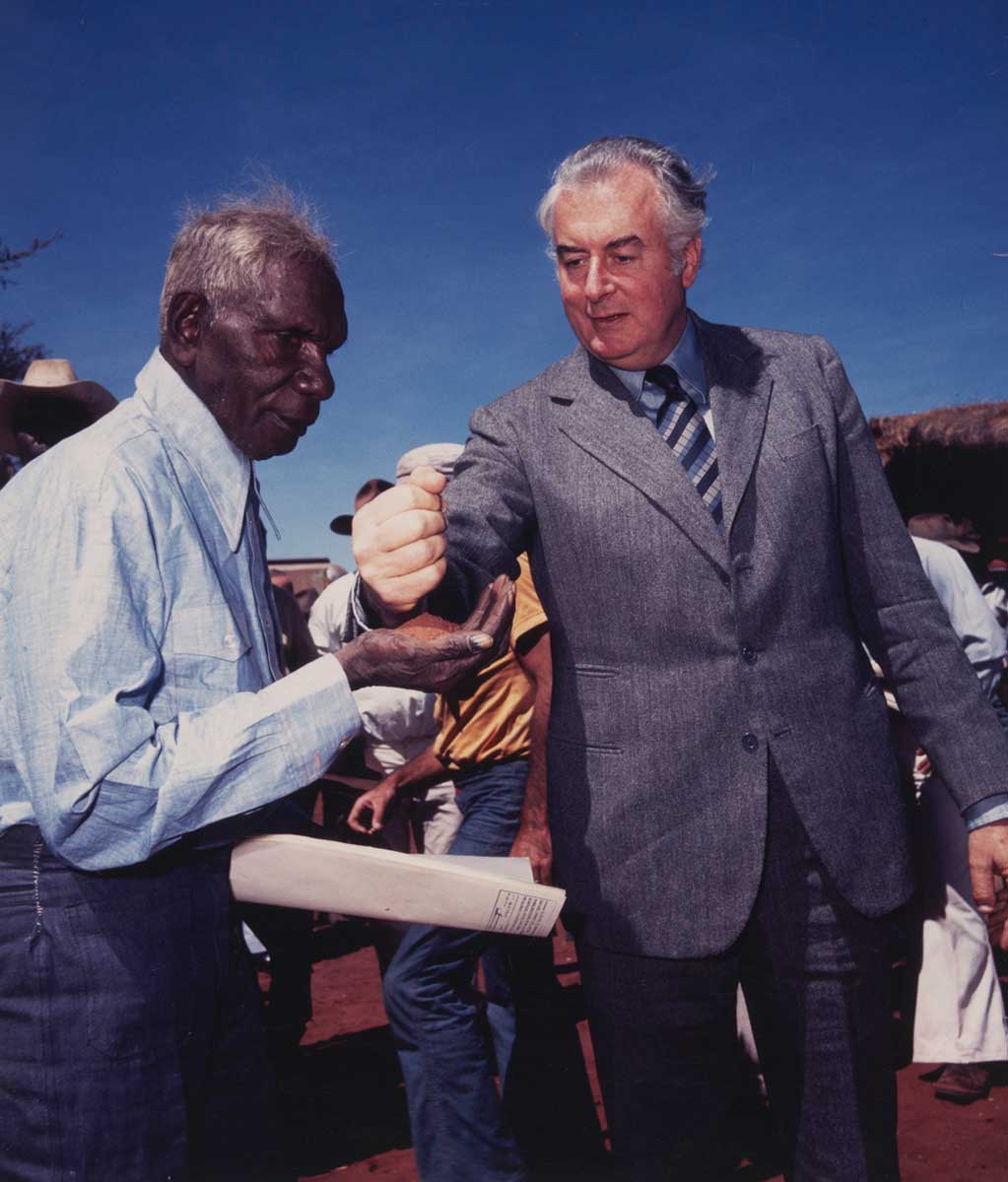Australia’s 21st Prime Minister

5 December 1972 to 11 November 1975
Gough Whitlam came into office in late 1972.
The Australian Labor Party had been in opposition for 23 years, and Whitlam, who had reformed Labor’s policies, was keen to bring a program of social reform to the people of Australia.
He ended conscription, established new Commonwealth agencies like Aboriginal Affairs, Environment, and Urban and Regional Development, and introduced universal health care with the Medibank Scheme.
Economic woes and political mistakes resulted in the Opposition refusing to pass his government’s Budget Bills in the senate.
In 1975, he became the only Prime Minister to be removed from office by the Governor-General.
Whitlam's beginnings
Edward Gough Whitlam (commonly known by his middle name, Gough) was born in Kew, Melbourne, on 11 July 1916. He was the first of two children of Harry FE Whitlam and Martha Maddocks.
Harry joined the Commonwealth Public Service in Melbourne, and rose to become the Commonwealth Crown Solicitor. The family moved to Sydney in 1918 and to Canberra in 1928.
Whitlam was educated at Mowbray House and Knox Grammar School in Sydney, then in Canberra at Telopea Park High School and Canberra Boys’ Grammar School. He went on to the University of Sydney, from which he graduated in arts and law.
He married Margaret Dovey in 1942, and they had four children.
Whitlam enlisted in the Royal Australian Air Force (RAAF) in 1941, served as a navigator, and was discharged as a flight lieutenant in 1945. He was admitted to the New South Wales Bar in 1947 and practised as a barrister, being appointed Queen’s Counsel in 1962.
Having joined the Australian Labor Party in 1945, Whitlam unsuccessfully contested the state seat of Sutherland in 1950.
Whitlam's entry into federal politics
Whitlam entered federal parliament in November 1952, winning the seat of Werriwa in a by-election. He was elected Deputy Leader of the federal parliamentary Labor Party in March 1960. He succeeded Arthur Calwell as leader in February 1967, which made him Leader of the Opposition.
As Labor deputy and leader, Whitlam played an important part in reviving the party’s electoral fortune, through modernisation of the party platform so as to appeal to an emerging generation of better-educated voters.
He helped the party throw off its image of being under Communist influence and control by party officials with no responsibility to parliament. He also won Labor many supporters by persuading the party to accept government financial support of non-government schools.
In June 1971 Whitlam led a Labor delegation to China. Undertaken at a time when the Liberal–Country Party coalition government still refused to establish diplomatic relations with China, this demonstrated his statesmanlike qualities.

Prime Minister Gough Whitlam
Whitlam became Prime Minister on 5 December 1972, following Labor's victory at the general election.
Campaigning on the theme, ‘It’s Time’ – that is, time for a Labor government after 23 years of Liberal–Country Party rule. Labor promised electors an ambitious package of reforms.
These included an immediate end to Australia’s involvement in the Vietnam War and an end to military conscription; diplomatic recognition of China; independence for Australia’s territories of Papua New Guinea; free university education; a national health scheme; and a program of urban decentralisation through the creation of ‘regional growth centres’.
Although the government led by Whitlam had a comfortable House of Representatives majority, it did not control the Senate.
The Senate’s threat to block the government’s Budget in April 1974 prompted Whitlam to obtain a double dissolution of parliament, only the third time this had occurred since the foundation of the Commonwealth in 1901.
Labor retained government at the subsequent general election on 18 May 1974 but still lacked control of the Senate.
Initiatives implemented by Whitlam government
While in office, the Whitlam government implemented its huge program of reform. Among its many initiatives were:
- 1972: end of conscription.
- 1973: establishment of new Commonwealth agencies and functions, including departments of Aboriginal Affairs, Defence (amalgamation of Air, Army and Navy departments), Environment, Urban and Regional Development. Other innovations were Aboriginal Land Rights Commission; Adviser to the Government on Women’s Affairs; Institute of Criminology; Law Reform Commission; Schools Commission; Social Welfare Commission.
- 1974: Aboriginal Land Fund Commission; Australian Legal Aid Office; National Employment and Training Scheme.
- 1975: Australian Heritage Commission; Australian National Parks and Wildlife Service; Australian Postal Commission; Australian Telecommunications Commission; Commissioner for Community Relations; Family Law Act (under which divorce law was reformed and the Family Court established in 1976); Medibank Health Scheme.
Constitutional crisis leading to Whitlam's dismissal
With a great interest in international affairs, Whitlam travelled more widely than any previous Prime Minister or opposition leader. Among his many overseas tours he visited most nations of Europe, Asia, the Middle East, Pacific and North America.
Following a series of controversies involving Labor ministers and revelations of government attempts to obtain foreign loans through unconventional channels, the Liberal–National Country Party opposition refused to allow the government’s budgetary legislation to pass the Senate in 1975 in the hope of forcing the government to an election.
From October to November 1975, with the government’s monetary supply effectively cut off, a grave constitutional crisis resulted.
The crisis climaxed on 11 November 1975, when the Governor-General, John Kerr, withdrew Whitlam’s commission as Prime Minister, commissioned the Liberal leader Malcolm Fraser to form an interim government until a general election could be held, and dissolved the parliament.
Whitlam thus became the only prime minister in Australian history to have been removed from office while commanding the confidence of the lower house.
After perhaps the most bitter and divisive election campaign in Australian history, Malcolm Fraser’s Liberal–National Country Party coalition routed Labor at a general election on 13 December 1975, winning 56 per cent of the overall vote, 91 of the 127 House of Representatives seats, and 35 of the 64 Senate seats.
This resounding victory gave the coalition a record majority in the House of Representatives, and a six-seat majority in the Senate.
Whitlam's resignation from parliament
After Labor was defeated at the 1977 general election, Whitlam quit the party leadership and was succeeded by WG Hayden. He resigned from parliament in July 1978.
Whitlam's life beyond politics
In 1978 Whitlam become a visiting fellow at the Australian National University. He later held visiting professorships at Harvard and Adelaide Universities.
In 1979 he published a book about the events leading to his dismissal, The Truth of the Matter. In 1983 he was appointed Australian ambassador to UNESCO by the Labor government led by Bob Hawke. In retirement Whitlam continued to lecture and comment on political and constitutional issues. Whitlam died on 21 October 2014 in Sydney.
Legislation passed under Whitlam
The legislative program of the Whitlam government was groundbreaking and fast-paced. A whole raft of legislation covering existing and new areas of government activity was passed. In 1973, for example, 203 Bills were passed, 46 more than the previous record of 157 in 1968.
- The Prices Justification Act 1973 established the Prices Justification Tribunal to act as a watchdog on the price of goods and services supplied by companies.
- The Pipeline Authority Act 1973 established the National Pipeline Authority to oversee the planning and construction of a national pipeline system and its subsequent operation and maintenance.
- The Health Insurance Act 1973 established ‘Medibank’, a national health scheme funded by levy which provided free public hospital treatment and medical benefits totalling at least 85 per cent of the cost of doctor and hospital services.
- The Trade Practices Act 1974 outlawed restrictive trade practices and ensured consumer protection and product and manufacturing liability.
- The National Parks and Wildlife Conservation Act 1975 established a service to plan and manage national parks in line with international standards.
- The Racial Discrimination Act 1975 enabled Australia to ratify the International Convention on the Elimination of all Forms of Discrimination.
- The Family Law Act 1975 replaced the existing grounds for divorce with a single ground, irretrievable breakdown of marriage (for example, having separated and lived apart for 12 months or more) and the extension of federal jurisdiction to maintenance, custody and property matters.
- The Administrative Appeals Tribunal Act 1975 established tribunals to review the discretionary decisions of ministers and officials.
- The Australian Heritage Commission Act 1975 established the Australian Heritage Commission to advise the Government and Parliament on the condition of the National Estate and how it should be protected.
In our collection

